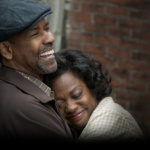The similarities between August Wilson’s Fences (upon whose play of the same name his screenplay is based) and Arthur Miller’s Death of a Salesman are striking. Not just in terms of themes, plot and family dynamics, but to use Martin Luther King-speak “the content of their character”. Furthermore, both were worthy recipients of the Pulitzer Prize for Drama and a Tony Award for Best Play in 1987 and 1949 respectively. So, Fifty Shades of Beige this is not!
At the head of the table sits Troy Maxson (Denzel Washington, making his third directorial outing after Antwone Fisher and The Great Debaters). Like Willy Loman before him, he is a giant of a man who casts a commanding shadow over his wife Rose (Viola Davis), their son Cory (Jovan Adepo) and his son from a previous relationship Lyons (Russel Hornsby). “A day late and a dollar short when it comes to understanding,” when Troy says “Jump” his family reply “How high?” At least they did, until time and tide caught up with him and their patience snapped.
The odds against Troy living the American Dream were stacked against him from day dot. One of eleven children, “the world suddenly got big” when his mother ran away from his evil father and he succumbed to “the walking blues” after leaving home at the tender age of fourteen and falling into a life of crime. A promising career in baseball was cut short due to racism (“The coloured guy got to be twice as good before he get on the team.”), a lengthy prison sentence robbed his wife of a husband and his sons of a father, and on the wrong side of fifty he finds himself at the bottom of the scrap heap (literally) as a garbage collector. To use Willy’s surname: Low, man!

It is little wonder, therefore, that he wants to build a fence around his wife and family to protect them from the slings and arrows of outrageous fortune. But as his friend and colleague Bono (Stephen Henderson) says: “Some people build fences to keep people out and other people build fences to keep people in.” Rose falls into the latter category. And judging by Troy’s track record with the ladies, particularly those with “hips as wide as the Mississippi river”, she is well within her rights to do so.
But the fence is also a metaphor for the emotional barrier Troy has built between him and his sons, whose relationship with their father can at best be described as distant and at worst one of mutual hatred. Cory being a bit like Biff Loman in that he is a promising footballer who harbours a desire to get away from the “shadow” who “followed you everywhere”, “weighed on you and sunk into your flesh.” And his stepbrother Lyons, a penniless musician who is forever on the cadge, is a bit like the hapless Happy Loman. “You still trying to get something for nothing,” Troy lectures before bowing to his wife’s persuasion and tossing him ten dollars. But not before firing a poisoned dart: “Life don’t owe you nothing.”
Throw into the mix his disabled brother Gabriel (Mykelti Williamson) who was badly injured during the Second World War, a possible P45 dropping through his letterbox after challenging his employer on “How come you got all the whites driving and the coloureds lifting?” and his perpetual dual with death whom he describes as a member of the Ku Klux Klan in a white robe and hood, and what you’ve got is a cauldron of toil and trouble which is in danger of boiling over. But what holds the film and the family together is love, a desire to do the best you can and as Rose says movingly towards the end of the film to do more good than harm.
The cast are excellent. And though I’m not one for gongs, put your last groat on Viola Davis adding to her BAFTA and Golden Globe for Best Supporting Actress at the forthcoming Academy Awards. The chemistry between her and Washington fizzes like an Alka Seltzer, especially during their argument when Troy comes clean about his infidelity. And the final scene, much like the Requiem at the end of Death of a Salesman, is both moving and uplifting.
The wordy nature of the script, single scene setting and lengthy running time of 140 minutes might prove taxing at times, but when the performances, writing and direction like Bono’s grasp of money are “right as fireworks on the Fourth of July”, I have only one thing to say: get off the fence and go see!
Video courtesy of: Paramount Movies
Director: Denzel Washington
Writers: August Wilson (screenplay), August Wilson (based upon his play “Fences”)
Stars: Denzel Washington, Viola Davis, Stephen Henderson
- REVIEW: Orphans @ Edinburgh King’s Theatre ⭐⭐⭐⭐ - 13th April 2022
- REVIEW: Everybody’s Talking About Jamie @ Edinburgh Festival Theatre ⭐⭐⭐⭐ - 30th March 2022
- REVIEW: Sheila’s Island @ Edinburgh King’s Theatre - 2nd March 2022
